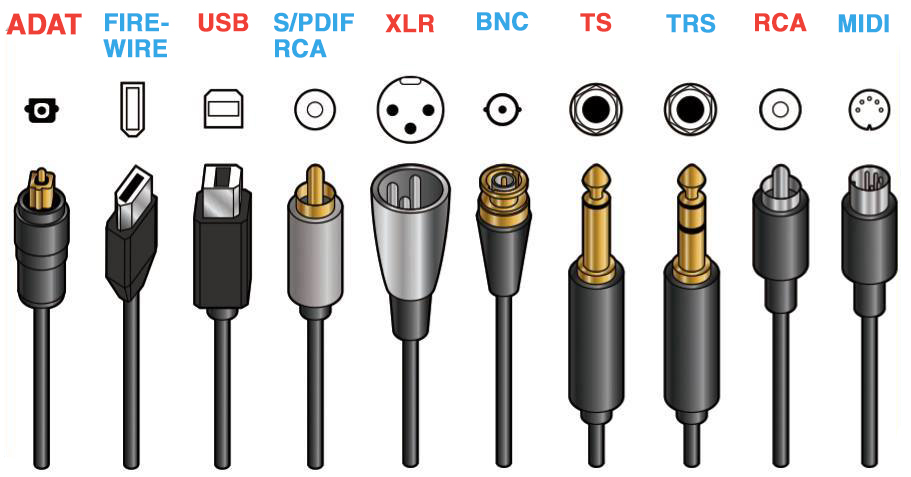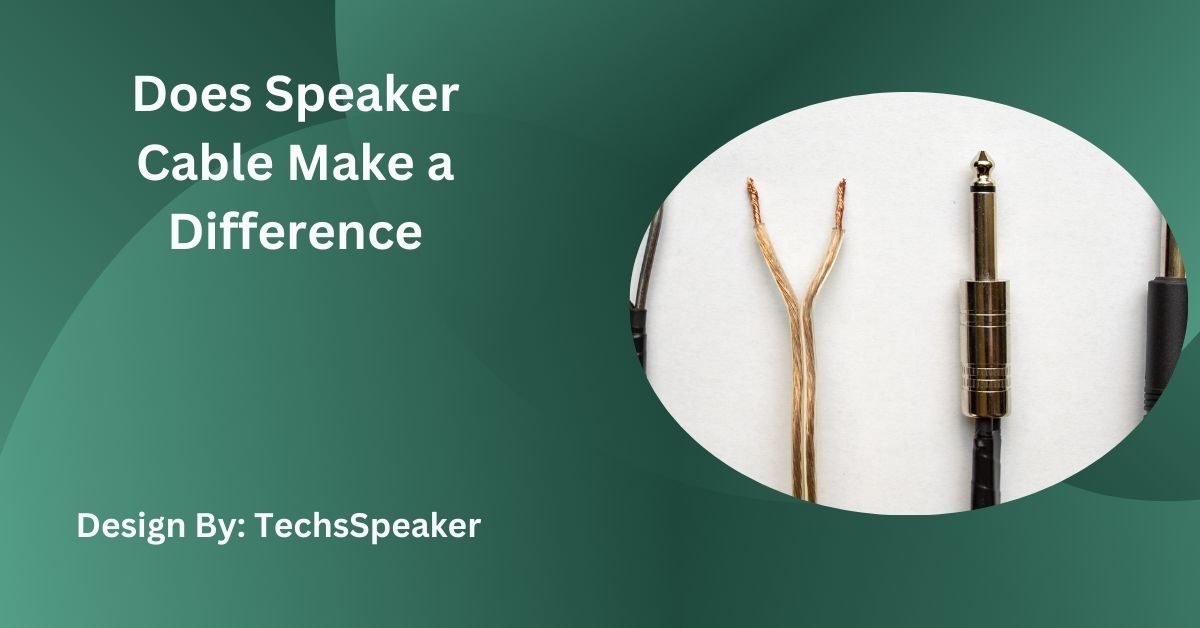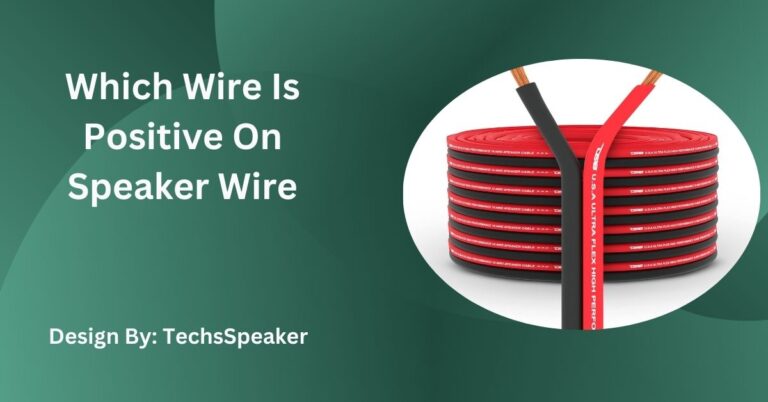Does Speaker Cable Make a Difference – Detailed Guide!
Choosing the right speaker cable can enhance audio quality. Factors include material, gauge, and length. While high-end cables may offer better performance, their benefits vary based on system quality and personal perception.
Choosing the right speaker cable can significantly impact the quality of your audio system. This article explores how speaker cables affect sound quality, the factors to consider when selecting cables, and whether investing in high-end cables is worth it.
Understanding Speaker Cables:
Speaker cables are the conduits that transfer audio signals from your amplifier to your speakers. They play a crucial role in maintaining signal integrity, ensuring that the sound produced is clear and accurate.
Key Factors Affecting Speaker Cable Performance:

Material
The material of the speaker cable is one of the primary factors affecting sound quality. Common materials include copper, silver, and gold.
- Copper: Copper is the most common material used in speaker cables due to its excellent conductivity and affordability. It provides a good balance between performance and cost.
- Silver: Silver offers better conductivity than copper but is more expensive. It is often used in high-end cables for its superior performance.
- Gold: Gold is rarely used for the entire cable but is often used for connectors due to its resistance to corrosion, ensuring a reliable connection over time.
Cable Gauge
The gauge, or thickness, of the speaker cable affects its ability to carry the audio signal. Thicker cables (lower gauge numbers) have lower resistance and are better for longer runs or higher power systems.
- Thicker Cables: Ideal for longer distances and high-power applications, reducing resistance and potential signal loss.
- Thinner Cables: Suitable for shorter distances and lower power systems, offering flexibility and easier installation.
Length
The length of the speaker cable can impact performance. Longer cables introduce more resistance and potential signal loss, which can affect sound quality. It’s essential to use the shortest cable length necessary to reduce these effects.
Resistance, Capacitance, and Inductance
These electrical properties of speaker cables influence how accurately the audio signal is transmitted:
- Resistance: Lower resistance means better signal transmission and less power loss. It is crucial for maintaining audio quality over long distances.
- Capacitance: Lower capacitance reduces signal degradation, particularly at higher frequencies, preserving the clarity of the audio.
- Inductance: Lower inductance ensures that the signal’s high-frequency components are not attenuated, maintaining the detail and brightness of the sound.
Do High-End Speaker Cables Make a Difference?
High-end speaker cables often claim to offer superior sound quality. However, the actual difference they make can be subjective and dependent on various factors:
- Audio System Quality: In high-end audio systems, the difference in sound quality may be more noticeable compared to budget systems.
- Listening Environment: The acoustics of your listening room can affect how much of a difference speaker cables make. A well-treated room can enhance the perceived improvement.
- Personal Perception: Audio perception is subjective, and what sounds better to one person may not be noticeable to another. Personal preferences play a significant role in the perceived difference.
Also Read: Alexa Speaker Groups Not Working – Troubleshooting Guide!
Practical Considerations:
Cost vs. Benefit
When deciding whether to invest in high-end speaker cables, consider the cost versus the potential improvement in sound quality. For many listeners, moderately priced cables provide a good balance of performance and affordability.
Installation and Maintenance
Proper installation and maintenance of speaker cables can ensure optimal performance. Avoid bending cables sharply, keep them away from power cords to prevent interference, and regularly check connections to maintain sound quality.
DIY Speaker Cables
For those who enjoy DIY projects, making your own speaker cables can be a cost-effective way to achieve high performance. Using high-quality materials and following proper techniques can result in excellent sound quality.
Comparing Different Types of Speaker Cables:

Standard Cables vs. Bi-Wire Cables
- Standard Cables: These are the most common type of speaker cables, connecting the amplifier to the speakers with a single set of wires.
- Bi-Wire Cables: Bi-wire cables have separate conductors for the high and low frequencies, potentially improving sound clarity and reducing distortion. This setup can provide a noticeable improvement in some audio systems.
Shielded vs. Unshielded Cables
- Shielded Cables: Shielded cables have an additional layer that protects against electromagnetic interference (EMI) and radio frequency interference (RFI). This can be beneficial in environments with high levels of electronic noise.
- Unshielded Cables: Unshielded cables are more flexible and easier to handle but may be more susceptible to interference in certain environments.
Tips for Choosing the Right Speaker Cable:
Match Cable to Your System
Consider the quality and specifications of your audio system when choosing speaker cables. High-end systems may benefit more from premium cables, while budget systems might not show a significant difference.
Consider Future Upgrades
If you plan to upgrade your audio system in the future, investing in higher-quality cables now can save you from having to replace them later.
Test Different Cables
If possible, test different cables with your audio system to find the one that best suits your preferences and listening environment.
FAQs:
1. Do high-end speaker cables improve sound quality?
High-end speaker cables can improve sound quality, but the difference is subjective and depends on your audio system’s quality and personal preferences.
2. What materials are best for speaker cables?
Copper is common for its balance of cost and performance, while silver offers better conductivity. Gold is typically used for connectors due to its corrosion resistance.
3. How does cable gauge affect audio performance?
Thicker cables (lower gauge) have lower resistance, making them ideal for longer distances and high-power systems. Thinner cables (higher gauge) are suitable for shorter runs and low-power setups.
4. Does the length of the speaker cable matter?
Yes, longer cables introduce more resistance and potential signal loss, affecting sound quality. Using the shortest cable length necessary helps maintain optimal performance.
5. Are shielded speaker cables better?
Shielded cables protect against electromagnetic and radio frequency interference, beneficial in environments with high electronic noise. Unshielded cables are more flexible but may be more prone to interference.
Conclusion:
Choosing the right speaker cable can make a noticeable difference in your audio system’s performance. Factors like material, gauge, and length play crucial roles in maintaining sound quality. While high-end cables can offer benefits, their impact varies based on your system and personal preferences. Proper installation and maintenance are essential for optimal performance. Balancing cost and performance will help you achieve the best sound quality for your setup.







